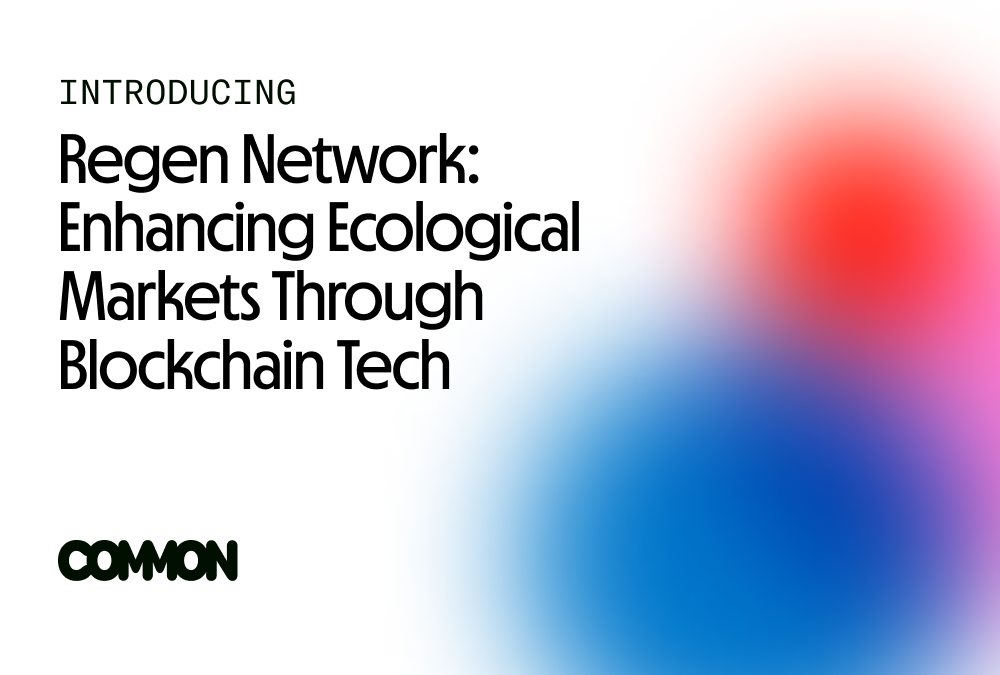Regen Network: Enhancing Ecological Markets Through Blockchain Tech

Environmental sustainability and crypto isn’t a crossover we see often, but the use case for using web3 is particularly appealing with Regen Network.
In an Alpha and Yap Space with Dave Fortson, Chief Growth Officer of Regen Network, we learned about how they're using blockchain tech to transform ecological asset markets and create meaningful impact for communities worldwide.
What is Regen Network?
At its core, Regen Network is developing tools for the origination and distribution of ecological assets. Through their public blockchain, Regen Ledger, they're creating a transparent and decentralized system for verifying ecological impact and bringing real-world ecological assets onchain.
"We're a software company that's developing software for the origination of ecological assets and claims to bring ecological real-world assets on chain and distribute them across Web3," Fortson explained.
They also have a strategy for web2 companies, institutions, and organizations looking to meet their climate goals.
Biodiversity crediting
While carbon credits represent a significant portion of climate finance markets today (tens of billions of dollars), Regen Network recognized early on that there were fundamental flaws in traditional carbon markets. These markets tend to be opaque, centralized, and not built for scale.
Regen Network has expanded beyond carbon to become an industry leader in biodiversity crediting. Their sophisticated architecture allows for the development of various ecological assets, including:
- Carbon sequestration credits - Measuring and verifying carbon pulled from the atmosphere
- Biodiversity credits - Including the innovative Biocultural Jaguar Credit
- Marine biodiversity credits - Such as their "Biodiversity Block" with Sea Trees
The biocultural jaguar credit
One of Regen Network's most compelling projects is the Biocultural Jaguar Credit, developed in partnership with the Achuar Sharamentsa community in the Amazon headwaters.
The credit is anchored in the presence of jaguars (detected through camera traps), which serve as indicators of healthy forest ecosystems. Jaguars are particularly sensitive to logging and road building, so their presence signals minimal disturbance to the land.
What sets this credit apart is its integration of the indigenous community's life plan. The methodology explicitly includes support for the community's healthcare and educational goals, with approximately 65% of the capital going directly to ground-level stewards.
Blockchain's role in environmental impact
The use of blockchain technology offers several key advantages for ecological asset markets:
1. Progressive verification
Regen Network has developed a "progressive verification" system that doesn't rely on a single trusted entity to verify ecological claims. Instead, multiple parties can attest to the validity of claims, creating a network of trust.
"We have a really beautiful product called the Regen Data Stream that allows for a Web2-type experience where local actors on the ground can post their photos, their ecological data, their stories, their contracts directly onto their project page," Fortson explained.
These claims can then be verified by multiple parties:
- The original claim from people on the ground
- Scientific verification using satellite data
- Third-party certification bodies
2. Transparency and traceability
By using digital wallets and blockchain technology, Regen Network brings unprecedented transparency to how funds are distributed. This helps ensure that a higher percentage of funds reach the communities doing the actual conservation work.
3. Community governance
The Regen token serves as a governance mechanism, with 30% of the token supply allocated to the Regen Foundation "for permanent governance use only." These tokens are distributed to land stewards, scientists, and communities around the world, putting the governance of Regen Ledger firmly in the hands of those most engaged with ecological regeneration.
Tokenized ecological health keeps growing
Fortson sees tremendous potential for growth in the ecological asset space. With BlackRock recently acknowledging that the environment provides a $55 trillion service per annum to businesses, the importance of tokenized ecological health products will only increase.
"Climate finance is going to be a trillion-dollar industry because it has to," Fortson emphasized. "There is no choice. There's no business that works properly without a healthy environment."
As Regen Network continues to evolve, they're focused on making it easier for entrepreneurs to build businesses on top of Regen Ledger, driving both economic value and ecological regeneration.

